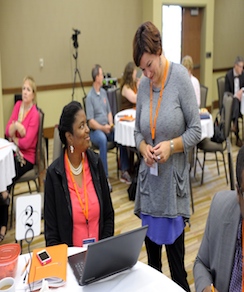Executive Leadership Academy: Utilizing University Resources to Improve School Districts
Universities and community colleges are robust resources that school district officials can utilize to improve their organizations. An example of this is the annual Chancellor’s Academy at the University of Illinois at Urbana-Champaign, a professional development conference for educators in local communities held in June. Chancellor’s Academy has proved beneficial to local educators, including assisting both Champaign and Urbana school districts in establishing instructional coaching models within their systems.
The University recently held its inaugural Executive Leadership Academy (ELA), a three-day professional development conference for Champaign, Urbana, and Rantoul school district administrators. With funding support from the O’Leary Foundation, University of Illinois College of Education faculty worked to design a program that would assist school leaders in expanding executive leadership skills through professional development. Executive Director of ELA, Dr. James Gallaher, worked with district administrative teams to conduct a Leadership Architect survey, a competency model to identify critical competencies of focus from a leadership standpoint. The theme for this year’s ELA was Leading Forward: Strategies for Innovative Leadership. Various university professors and partners drew upon those identified competencies throughout the workshops to assist administrators in moving forward in their leadership skills development.
The event began with an invigorating keynote address by Dr. Pedro Noguera, a nationally renowned professor from the University of California at Los Angeles, who implored attendees to resist the status quo and seek ways to provide more equitable opportunities for students who have been historically underserved in schools. He highlighted the tensions that exist between policy and practice and praised the ideas and missions of both the Executive Leadership Academy and the Chancellor’s Academy by stating, “When you’re in a town so close the university, schools should receive a benefit.”
Other notable ELA sessions included:
Leaders as Decision Makers: Dr. Mary Hermann, clinical assistant professor in the Department of Education Policy, Organization and Leadership and a former Illinois school superintendent, shared her practical experience in making leadership decisions and implored participants to consider how their decisions impact organizational capacity and can affect change.
The Communicative Side of Work Relationships: Dr. Robert Husband, a retired professor in the department of Speech Communications and co-founder and senior partner of Aslan Group consulting, delivered an enthusiastic presentation on considering who we are as communicators and how to strengthen our listening skills.
Culturally Responsive Evaluation and Assessment: Assessment and evaluations should be culturally responsive conveyed Dr. Stafford Hood, the Sheila M. Miller professor in Curriculum & Instruction and Educational Psychology in the College of Education, and we need to ask critical questions that will help us to obtain the answers to achieve this goal.
Real-Talk A Capstone Experience: Led by Dr. Preston James, retired Urbana school district superintendent, this session provided participants legal case scenarios which educators constantly face and asked participants to decide how they would react and resolve the issues. Panelists from organizations including the media, local police departments, school lawyers, and teacher unions, gave resolutions based on their perspectives.
This was the first Executive Leadership Academy, but as it moves forward Dr. Gallaher envisions continued expansion:
After a successful leadership development program with local school districts, the next step for the Executive Leadership Academy is to offer leadership development programming for education organizational leaders across the state of Illinois. Our goal is to become the first choice for educational leaders in the state of Illinois and beyond.
School districts around the state should consider their district needs and know that the University of Illinois’ Executive Leadership Academy is a potential resource to expanding the leadership skills of their school administrators.
Asia Fuller Hamilton is a graduate research assistant for the Pathways Resource Center (PRC). Ms. Fuller Hamilton is currently a PhD student at the University of Illinois at Urbana-Champaign in Education Policy, Organization and Leadership in the division of Educational Administration and Leadership. She can be reached at afullerh@illinois.edu.
